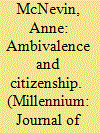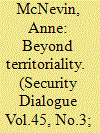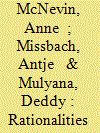| Srl | Item |
| 1 |
ID:
119985


|
|
|
|
|
| Publication |
2013.
|
| Summary/Abstract |
Irregular migration gives rise to political claims that test the limits of political community and the expression of human rights in an increasingly interconnected world. This article provides a theorisation of the political claims of irregular migrants that starts with the notion of ambivalence. I argue that the ambivalence present in such claims can be understood as a political resource that is generative of new political relations across the terrain of human mobility and border control. In order to discern the generative quality of ambivalence, I argue in addition for an approach to theory production that is grounded in concrete migrant struggles. The argument is made via a critique of two theoretical perspectives that are influential amongst scholars working at the intersection of Migration Studies and Political and International Theory: the work of Giorgio Agamben and the 'Autonomy of Migration'. An approach that avoids the reductive accounts of power evident in both perspectives provides a better starting point from which to assess the transformative potential of irregular migrants' political claims.
|
|
|
|
|
|
|
|
|
|
|
|
|
|
|
|
| 2 |
ID:
132340


|
|
|
|
|
| Publication |
2014.
|
| Summary/Abstract |
The key contention of this article is that contemporary practices of border security threaten to outrun the explanatory capacity of the spatial (territorial) and subject (citizen/migrant) registers habitually employed to think through human mobility. This represents a political problem as much as an empirical one. First, it implies that migration scholarship deploying categories of analysis informed by prevailing registers offers a limited perspective on contemporary techniques of migration governance; second, it suggests that such scholarship obscures the operation of power that works to enforce profoundly unequal hierarchies of mobility and represent them as politically neutral. In this article, I propose that resisting reversion to problematic categories of analysis offers the potential to think of human mobility without the state and territory as its foremost container concepts. I contend that such an approach - 'beyond territoriality' - is a crucial step on the way to negotiating the normative dimensions of border politics. The case is developed empirically via a grounded investigation of the mundane yet symptomatic practices of border security on the Indonesian island of Bintan.
|
|
|
|
|
|
|
|
|
|
|
|
|
|
|
|
| 3 |
ID:
147940


|
|
|
|
|
| Summary/Abstract |
This article examines an Australian-funded counter-smuggling campaign delivered in Indonesia from 2009 to 2014 as an example of the global regulatory regime known as Migration Management. Drawing on fieldwork conducted in Indonesia among the fishing communities targeted by the campaign, we problematize the campaign’s purported success. The appearance of success, we argue, is linked to four interrelated rationalities of governance—security, humanitarianism, managerialism, and colonialism—that shape the terms of reference through which the campaign was conceived, designed, and evaluated. These rationalities “make sense” of a campaign that can otherwise be read as indicative of circular and misdirected strategies of border security. In a second move, we show how the techniques deployed in the campaign give rise to challenges to technocratic control. We argue, by extension, that Migration Management is subject to subtle disruptions and subversions that emanate from the very rationalities through which it is sustained. Our argument exposes the politics at stake in a regulatory regime that is represented as neutral and of benefit to all. It also shows what stands in the way of template reproduction of the Management agenda.
|
|
|
|
|
|
|
|
|
|
|
|
|
|
|
|